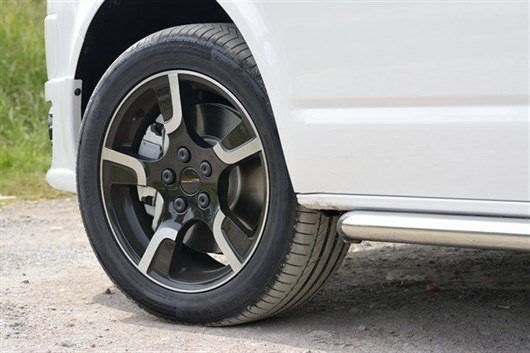HMRC plans company car style tax scheme for top-end vans
HMRC is believed to be planning a new personal taxation system for vans fitted with car-like equipment such as DAB radios, leather seats, alloy wheels and air conditioning.
The government is said to be considering a scheme similar to that used for company car benefit-in-kind payments, which is likely to replace the existing van benefit charge. It could see employees who use high-end vans and pick-ups for business and personal use pay more than they currently do.
“There are rumours that the government is looking to tax top-end vans with car-like specifications in a similar way to cars,” said Andy Picton, commercial vehicle editor at valuation specialist Glass’s.
“There’s nothing definite yet but there have been talks about vans being taxed in this way. The government hasn’t said anything about it but this is based on conversations I’ve had with various people who have intimated that [the scheme] is something it’s looking at seriously. It’s a possibility of what might happen.”

James Davis, director of commercial vehicles at auction firm Manheim, agreed that the scheme was on the cards: “I’ve heard HMRC is looking at ‘lifestyle vans’. They are going to look at the benefit-in-kind payment for anything that has a spec similar to an executive car, which is currently different for a commercial vehicle than it is for a car."
Davis warned that the introduction of such a tax could damage residual values of vans.
“It could have a massive negative impact on residual values, much like when HMRC played around with the road fund licence for emissions a few years ago. High emitting cars went into higher road fund licence groups and it killed the market for 4x4s and large, high emission cars.”
Both Picton and Davis said that the likely upshot of such a tax system would be a drop in sales of well-specced vans and pick-up trucks, with more businesses and owner-drivers buying basic, low-end models – and a spike in aftermarket conversions to avoid the tax.
“It could lead to those who want conversions to buy a standard van from a manufacturer, then go to an aftermarket converter to get around the loophole of tax and convert a standard van as secondary piece of work, adding alloys, air conditioning, leather seats etc,” said Picton.
“I think the conversion market will effectively go underground, because people will still want those vehicles. They’ll just buy a basic van and have the work done themselves – and you’re seeing a lot of that now anyway,” said Davis, who added that such a trend could in fact result in a drop in tax revenues for the government.
“If the manufacturers down spec everything and aftermarket converters step in, then these vans will go off the radar. So either the HMRC gets revenue as it does now or it loses the opportunity, because it’s pushing the new value or the new vehicle price downwards and more people will buy lower spec vehicles.”
He also claimed that the scheme would be very difficult to enforce: “There’s a piece of realism here that says ‘how on earth would you apply it?’ and at what point does [a van] stop being a commercial vehicle, because everything has to carry a tonne?
“How on earth do you prove it when you’ve got people who are putting their commercial vehicle through the business and using it on the weekends? That was why [HMRC] upped the industry £500 you used to pay for running a commercial vehicle as benefit-in-kind – it’s now about £1500. It’s not that far away from the benefit-in-kind tax that you’d pay on running a premium car.”
Neither HMRC nor HM Treasury confirmed the scheme nor did they deny them, telling HonestJohn.co.uk “we keep all taxes under review” – but van industry experts suggest plans are well underway.
Find out how much you’ll pay in van tax under the current scheme here

